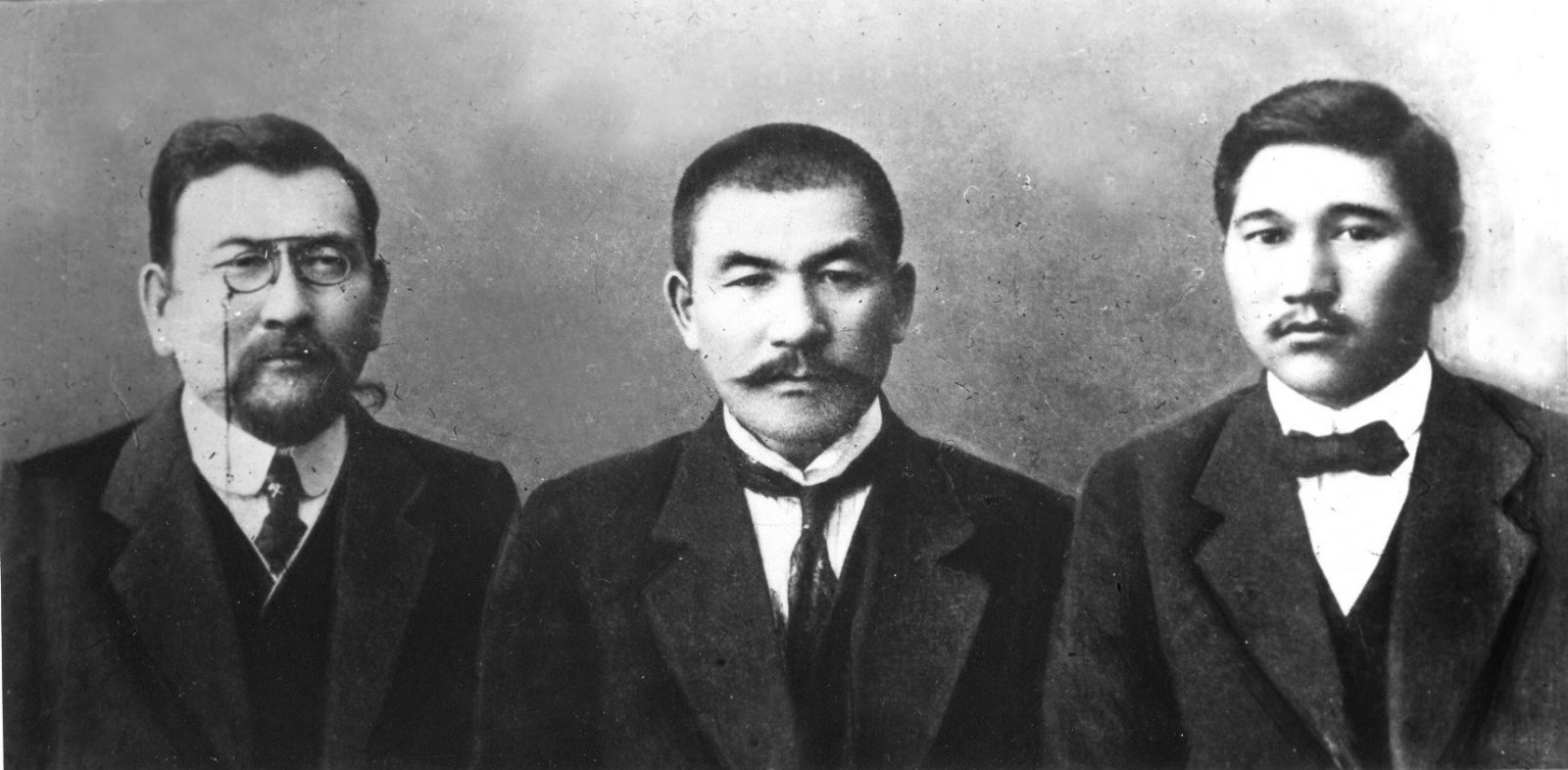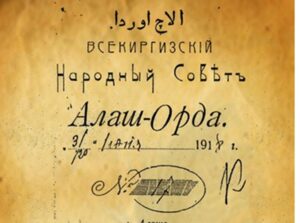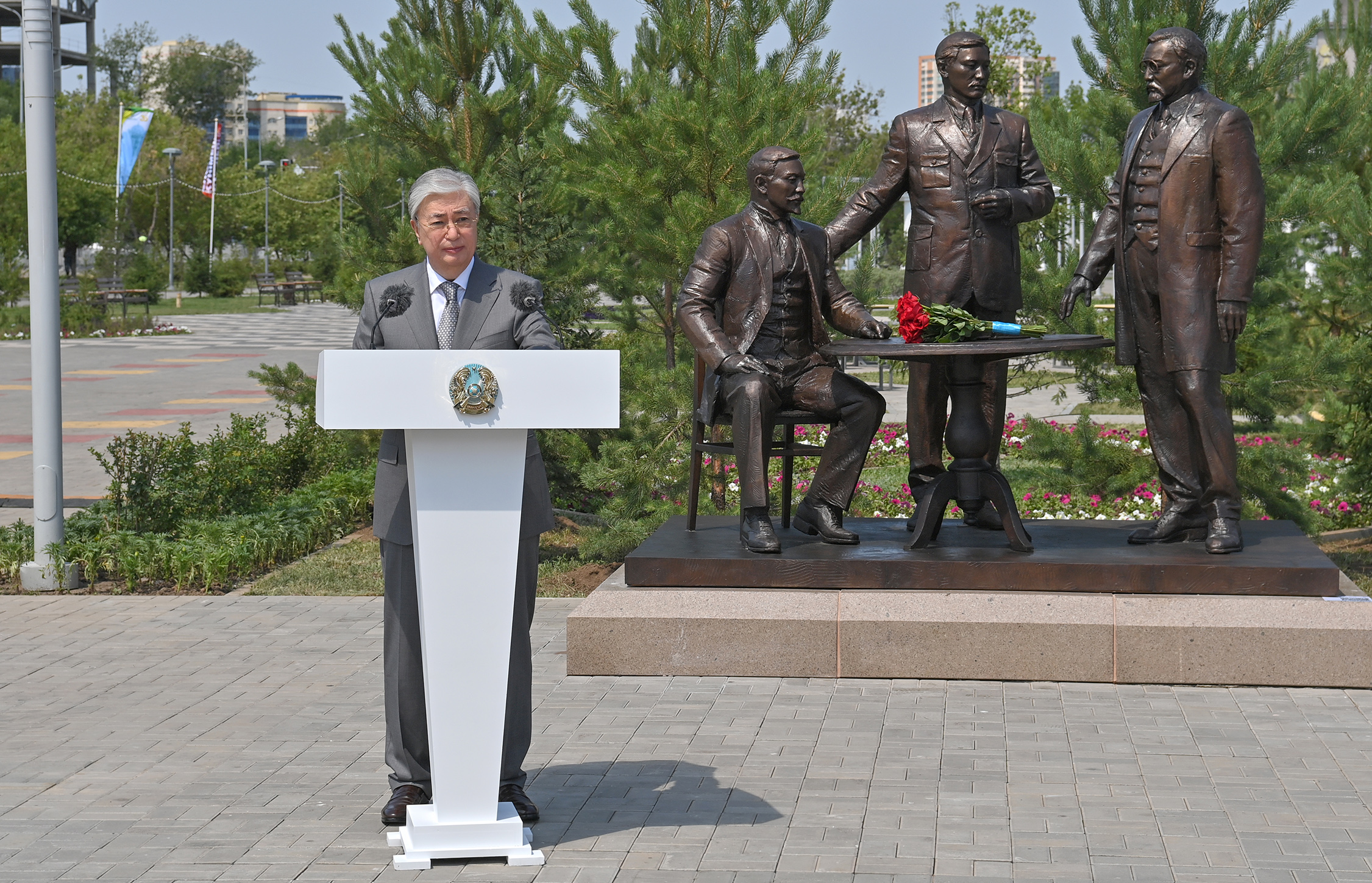ASTANA – Republic Day is a time to celebrate statehood and honor the role of the Alash (Kazakh intelligentsia) movement in shaping the nation’s destiny during the foundational period of Kazakhstan’s modern history.

From left to right founding fathers of Alash Orda, Akhmet Baitursynuly, Alikhan Bokeikhan, Mirzhakyp Dulatov. Photo credit: e-history.kz
Alash was a political movement in the early 20th century that aimed to establish an autonomous Kazakh state within the Russian Empire.
Led by prominent Kazakh intellectuals such as Alikhan Bokeikhan, Akhmet Baitursynuly, and Mirzhakyp Dulatov, among others, the movement called for the recognition of Kazakh autonomy, the preservation of Kazakh culture and language, leading to profound social, cultural, and economic transformations.
President Kassym-Jomart Tokayev, in his congratulatory remarks on Oct. 24, said much of the credit for the survival and institutional tenacity of the country is owed to the founding fathers of Alash Orda, who fought for freedom and drafted the first statehood document.
“This is the day of the revival of our centuries-old statehood, originating from the era of the Turkic Khaganates, the Golden Horde and the Kazakh Khanate. On this day, the idea of freedom for which the Alash activists fought has materialized,” he said.
First All-Kazakh congress
The first All-Kirgiz (Kazakh) Congress was held in Orenburg on July 21-28 in 1917 with the establishment of the Alash party, the body that established Kazakhstan’s autonomy.

The protocol book cover of the third All-Kirgiz (Kazakh) congress conducted in 1918. Photo credit: exclusive.kz
The framing of an autonomous Kazakh government has been an ongoing process. The 1917 February revolution and the abdication of Tsar Nicholas II accelerated the political unity of various layers of Kazakh society. The hopes of Alash intellectuals for liberation from colonial rule strengthened, and they started taking steps toward creating autonomy.
During the same congress, pivotal resolutions were reached on many matters, including the formation of a political party, land management, the formation of militia (police), court, educational issues and the status of Kazakh women, among others.
The main resolution of the congress was to defend the right of Kazakhs to territorial and national autonomy within the democratic, parliamentary and federal Russian Republic.
Bokeikhan was elected the chairman of the Alash party. The Kazakh newspaper was recognized as the official publication.
In his congratulatory speech, President Tokayev highlighted the role of Bokeikhan in Kazakhstan’s path to nationhood.
“Alikhan Bokeikhan said that the way to freedom lies only through the unity of the nation. The statesmen of our country have shown loyalty to this admonition of the great son of our nation. Having united at a crucial moment, they were able to defend national interests,” said Tokayev.
“The fateful document [Declaration on the State Sovereignty of the Kazakh SSR] corresponded to the aspirations and expectations of the people and was adopted thanks to the wisdom and prudence of the patriots of the country. Their courage and determination at a critical hour can be regarded as genuine heroism,” he added.
Alash party program
The draft of the Alash party program was published in the Kazakh newspaper on Nov. 21, 1917, and consisted of 10 paragraphs.

In 2021, President Tokayev attended the opening ceremony of the Alash leaders’ monument in Astana. Photo credit: akorda.kz
The program was an ambitious document written by ambitious men who were fully aware of the weight of history on their shoulders and the responsibility this new freedom entailed. The draft was prepared by Bokeikhan, Baitursynuly and Dulatov, among others. A substantial contribution was made by Barlybek Syrtanov, the author of the Kazakh State Charter, written in 1911 at the request of Bokeikhan.
“Russia should be a democratic, federal republic. (…) The regions inhabited by Kazakhs should be governed independently, being a federated body of the Russian Republic,” reads the first section of the document.
The document reflected such advanced ideas as the division of power, the universal character of elections and the creation of national autonomies.
“In the Russian Republic, all people are equal, regardless of religion, nation or gender. There is freedom to organize meetings, rallies, publish newspapers and books; government employees have no right to cross the threshold of a house without the permission of the owner; civil servants have no right to illegally detain people; arrest a person before trial and sentencing; a suspect must be brought before a judge within 24 hours, where there is no judge – within a week, the sentence is passed by a judge,” reads the document.
It is evident from these excerpts that the ideas of equality and the rule of law prevail.
“The question of religion must be separated from the affairs of the state. All have equal rights in religion. Freedom to accept and reject the faith,” said the draft program.
Second congress – establishment of Alash Orda
The second All-Kazakh Congress of the Alash Party was held in Orenburg in December 1917 and resulted in the forming of the government of the Alash autonomy, called Alash Orda.
The congress decreed the territory of Alash autonomy that included the Bokeyev Horde, Ural, Turgai, Akmola, Semipalatinsk regions, districts of the Transcaspian region, and Altai province inhabited by Kazakhs.
Semipalatinsk (Semei) was temporarily declared the center of Alash Orda’s autonomy. The government was headed by Bokeikhan.
A plan was developed to create a Kazakh people’s militia (police). Men between the ages of 20 and 35 who were fit for military service were drafted into the ranks of the people’s militia. The national fund of Alash Orda provided the militia with weapons and ammunition.
But the Alash Orda government was not in power for long. In 1920, it was officially resolved, leading to the exile of many of its leaders.
Although short-lived, the Alash Orda government set goals for the nation that, since then, has achieved success. It served as a precursor to the eventual Kazakh Soviet Socialist Republic within the Soviet Union and, later, the independent Kazakhstan.

